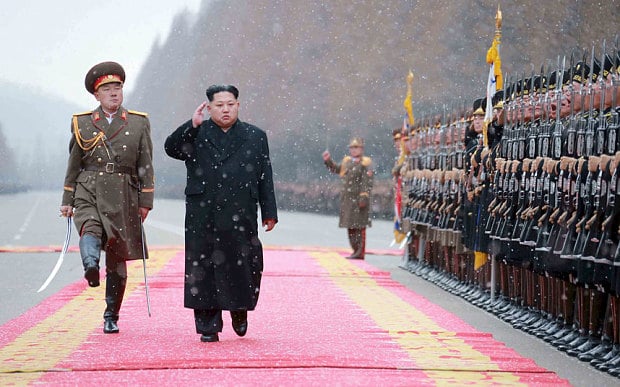Despite China’s complaints about the deployment of the American THAAD missile defense system in South Korea, China has continued to publicly increase pressure on the North Korean regime to do away with their nuclear weapons development program in recent weeks. Now, Russia has joined the motley crew of nations offering their own perspective on how the situation should progress.
In the weeks since President Trump met with Chinese President Xi, China and the United States have enjoyed a slightly less standoffish relationship when it comes to China’s ally and burgeoning nuclear power, North Korea. White House insiders suggest that Trump’s new strategy on North Korea relies heavily on China placing economic pressure on the already weak North Korean economy, and as such, rhetoric about the U.S. taking unilateral military action to remove Kim’s nukes has softened, replaced instead with a new emphasis on seeking a diplomatic solution to what many perceive to be a growing threat posed by North Korea.
“The United States seeks stability and the peaceful denuclearization of the Korean peninsula. We remain open to negotiations towards that goal. However, we remain prepared to defend ourselves and our allies,” U.S. Secretary of State Rex Tillerson said in an official statement this week.
“We have noted these expressions, and have noted the message conveyed in these expressions hoping to resolve the Korean nuclear issue peacefully through dialogue and consultation,” Chinese Foreign Ministry spokesman Geng Shuang said. “We believe this message is positive and should be affirmed.”
In a joint press conference held on Thursday with Russian and Japanese officials, Russian President Vladimir Putin, often seen as a more serious threat to American interests than Kim’s North Korean regime, expressed concerns about the situation developing on the Korean peninsula, but didn’t miss an opportunity to indirectly take a jab at all nations involved, including the United States.
“In my opinion, and in the opinion of the prime minister, the situation on the Korean peninsula has unfortunately got a lot worse,” said Putin.
“We call on all governments involved in regional matters to refrain from using belligerent rhetoric and to strive for peaceful constructive dialogue.”
Japanese Prime Minister Shinzo Abe, who was at the same press conference, then called on Pyongyang to “refrain from taking any actions that could be perceived as provocative by other countries.”
Japan has been on high alert due to the possibility of a pre-emptive nuclear strike since early last week.
It may be unlikely that Russia will take a more active role in working to dissuade North Korea from pursuing more advanced nuclear weapons, as they have little in the way of leverage over the reclusive state and claim to be actively pursuing stronger ties with Kim’s government. Alexander Gabuev, analyst at the Moscow Carnegie Center’s nonproliferation program, says most of Russia’s statements regarding the developing situation on the Korean peninsula are nothing more than rhetoric, going so far as to claim that “the only thing Russia cares about is its prestige” in regard to the Korean conflict.
“It wants to participate in the discussion but it is very clear about its limited capacity to influence North Korea,” he said. “The general tendency for Russia has been to let China take the lead on North Korea policy because it has a plan and it has more at stake in the conflict.”
Already have an account? Sign In
Two ways to continue to read this article.
Subscribe
$1.99
every 4 weeks
- Unlimited access to all articles
- Support independent journalism
- Ad-free reading experience
Subscribe Now
Recurring Monthly. Cancel Anytime.
The United States is said to be using a strategy referred to as “pressure and engagement” against “anyone in the international community with ties with North Korea,” in order to push Kim’s regime toward nuclearization, according to Susan Thornton, acting assistant secretary of state for East Asia. The first step of that process, she explained on Thursday, was to ensure countries were enforcing trade sanctions that should already be in place.
According to PACOM Commander, Admiral Harry Harris, U.S. forces are seeing “more positive, proactive activity” than ever before by China regarding North Korea’s nuclear program, but wasn’t prepared to suggest that it would be enough to dissuade Kim Jong Un, adding, “I wouldn’t bet my farm on it.”
Image courtesy of Reuters










COMMENTS